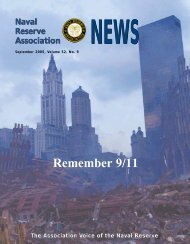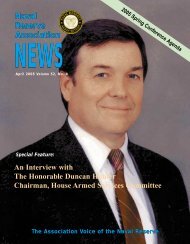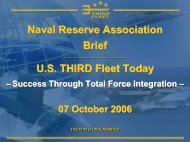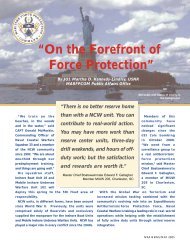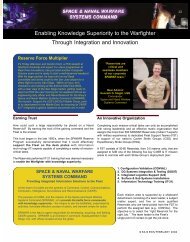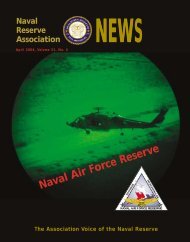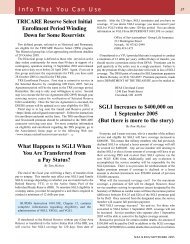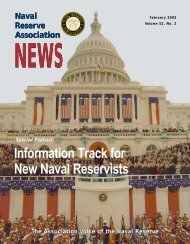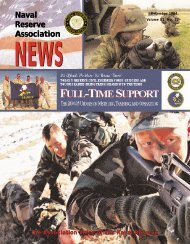Naval Reserve Association Naval Reserve Association
Naval Reserve Association Naval Reserve Association
Naval Reserve Association Naval Reserve Association
- No tags were found...
Create successful ePaper yourself
Turn your PDF publications into a flip-book with our unique Google optimized e-Paper software.
INTERVIEW WITH MCPONnumber of IA assignments out there. I tell you something thatmakes me proud. There was a Sailor when I was visiting one ofthe units; he was a mobilized Reservist. He was from a very smalltown in Arizona. He showed me some photographs from hishometown, and they had these banners with his name on them atthe general store, the only general store in his town. The marqueeat the church had his name [on it] and at the fire station [too]. Andhe is the only one from his town that is serving in Iraq, and theyare so proud. The whole community is behind this Sailor and thatis their connection. And what the <strong>Reserve</strong> force does is it keepsthat connection with our communities in the heartland ofAmerica because they see these young men and women going outand doing the Nation’s work, putting their lives on hold, and thencoming back. That makes me very proud.I don’t know, coming up short? I talk to Reservists that want togo out there. I’ve talked to many that have said, “I want to go.What can we do to get out there?” We seek opportunities for our<strong>Reserve</strong> force. They are hungry for that opportunity.Let me tell you a great statement to the leadership in the<strong>Reserve</strong> force. I have a senior enlisted on the ground in Iraq, aCommand Master Chief. His job there is to be the senior MasterChief for those ground forces in Iraq, and he works on theGeneral’s staff. I have had several Master Chiefs wanting this job;Active duty Master Chiefs and all well qualified individuals. Theindividual I selected was from the <strong>Reserve</strong>. I didn’t select himbecause he was a Reservist. I selected him because he was theright leader to put in there and because he had experience there.Talking with him, he was the type of Master Chief that when yousit down with him, he makes you check yourself to be sure thatyou are doing enough because he is so committed. This is MasterChief Covington.Chief Worrell: One of our other issues is <strong>Reserve</strong> dentalcare. I’m sure that if you have visited <strong>Reserve</strong> NOSCs this issuehas come up.MCPON: You know it hasn’t come up. I understand the issueand I think that it is something that I should look into. I’m surethat because of your position [Corpsman] that you hear it. Whatdo you hear?Chief Worrell: Absolutely. In my little world, I deal a lot withthe Marines. What I hear is that it is the first term, the youngSailors and young Marines who are still in college and don’t havedental insurance. We are telling them that they are non deployable,can’t be mobilized, and in some cases they are gettingnegative page 13 entries because they don’t bring themselves outof a class three status soon enough, and they can’t afford to do it.We know that there is dental insurance that they can pay twelvedollars a month to get and that is great for cleaning and a checkup; but when they need wisdom teeth pulled to make them deployable,it still costs them twelve hundred dollars out of their pocket.They are saying, I want to deploy, I want to do this; but I cannotafford to get my teeth fixed, and you’re not taking care of me.The reality is, when you get mobilized, no pun intended, it’s likepulling teeth even then to get dental care before they deploy.MCPON: I’m going to talk to the Force Master Chief[Pennington] about this and get his thoughts on this. I need somemore information on how many people this is affecting and arewe doing the right thing.Chief Worrell: I think that is mostly affecting the young. Inmy opinion, most of the people by the time they have reenlistedonce; they are out of college; and they have settled into some sortof job with benefits. It’s that first term in the <strong>Reserve</strong> where theproblem is.Chief Worrell: I think you saw the question from the FleetMarine Force hospital corpsman community in regards to ourGeneva Convention non-combatant status. That came out ofdiscussion with corpsmen and my own experience in Iraq. Notthat this isn’t already being worked around anyway; but to try tomeet Geneva Convention standards, corpsmen are not supposedto be carrying M-16s. My question is, is there any talk aboutchanging that?MCPON: You know, I haven’t heard any talk about that.Because the M-16 is considered an offensive weapon and as ahospital corpsman you are considered a non-combatant and soyou can only have a nine millimeter for defensive purposes. Inthis type of war that we are fighting, I know that becomes achallenge; but I haven’t heard any talk and to change that[convention] is a huge step.Chief Worrell: The issue that we ran into over there is thatwhen you are assigned to a vehicle, there are only five seats in thevehicle; and every vehicle has five weapons, except the one thatthe Doc is in. Sometimes that is an issue, especially when youonly have four vehicles in a unit and you are out in a combat situation.That is why the question came up.18 NRA NEWS/SEPTEMBER 2007



